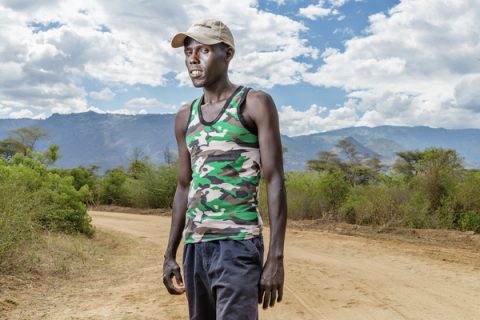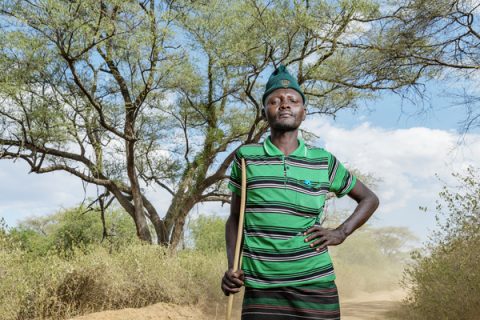Former tribal enemies learning to become good neighbours
The relationship between the Pokot and Markwet tribes is difficult. During the past year, fighting between the two has taken dozens of lives. Finn Church Aid is helping to build peace between the tribes. Two former warriors explain how it can be done.
It all began with watermelons.
Tensions had always existed between the Pokot and Markwet tribes in the remote rural regions of northwest Kenya. The Pokot are a tribe of cattle ranchers and the Markwet rely more on farming. Conflicts arose from time to time, particularly over water and land rights. Also, cattle rustling was a way of quickly gaining wealth and taking revenge. Becoming a warrior, which practically meant cattle thief, was a perfectly viable career alternative for many young people.
However, the two tribes lived in relative peace, until in March 2016 a group of Pokot allowed their cattle to graze on their neighbours’ melon fields. Damages rose to 5,000,000 Kenyan shillings, or about 45,000 euros. Nobody in these remote regions can produce such sums. Since the Pokot were unable to pay, the Markwet stole seven camels in retaliation. This sparked violence along the border region between the two tribes resulting in at least 30 deaths.
The threat of violence has persisted ever since, and many have fled their homes. Children are afraid to go to school as are occasionally the teachers. Trade between the tribes has come to a halt, further impoverishing the region.
Finn Church Aid has been building peace between the tribes since 2015. FCA workers have assisted in laying the foundation by making sure everyone’s opinions and experiences, including those of women and children, are taken into account in the peace efforts, and the inclusivity and security of meetings.
“The next step is finding income and education opportunities for young people. That is the only way to definitively end violence”, says John Bongei, FCA Programme Coordinator for peace work in Kenya.
To push for peace, a conference between the two tribes was organised in December 2016. It was the second attempt. The conference was originally supposed to take place three weeks earlier, but the Markwet announced they were not ready to sit down at the time.
Now the tribes have set up joined groups to work out issues of land usage, trade, water sharing and so on. Former warriors from both tribes also took part in peace talks. Here is what two of them have to say:
David Kanda, 33, former Markwet warrior

“The atmosphere in the talks is good, there are no particular tensions. It doesn’t feel bad to talk with the Pokot. I just tell them we want to love them!
I think there are two things we need to agree on in these particular talks. First, that people simply must be able to get along and coexist. Second, that we must continue trade. The Markwet sell fruits, like mango and bananas. The Pokot mostly sell goats. Both hold their markets on different days. They must be allowed to attend our market in peace and we must be allowed to attend theirs in turn. At the moment, people are afraid, and they dare not go onto the other tribe’s land.
I am now a businessman, but you know I was the mightiest warrior of all. Back then I was young and I didn’t have a family yet. I might have been 15 when I started stealing cattle. I stole cows and goats and climbed up trees to break apart beehives, which some Pokot use to produce honey.
The life of a warrior is not good. Snakes and wild animals can bite you when you go out at night and it is very difficult to see them, especially the snakes. When you ford a river in the dark, you can get attacked by a crocodile. This happened to many people. I saw about a dozen people get killed when I was cattle rustling.
I also noticed that if you want to get married as a warrior, it is very difficult to find a wife. Fathers don’t want to give their daughters to warriors. That is why I decided to quit fighting.
I haven’t participated in violence or theft in years. My life is stable and peaceful. My children go to school, I buy goats from the Pokot and sell fruit with my wife. The difference compared to my life as a warrior is remarkable.
A good way to build peace is for people from the Pokot and the Markwet tribes to marry each other. It is possible. Would I take a Pokot wife, you ask? My other wife is a Pokot! She is so beautiful, wise, pure and lovely! I have always admired the Pokot women and hoped very much to get a wife from among them. And then I got her!”
Noren Lorengetum Lokoryara, 40, former Pokot warrior

“The most important matter to discuss here today is grazing land. There is much more of it on the Markwet lands, because they have more rainfall over there. We need the right to allow our animals to graze on some of the good grazing land.
In the past, if I ever went on Markwet lands, I went there to steal cows or goats. I cannot remember the first time I did that but we did it often.
At first, it seemed smart, but soon it started to feel awful. It was awful seeing people die. Many people lost what they had been building their entire lives. I lost people close to me, but I also killed.
After one battle we decided we wanted peace. The life of a warrior was not good. For example, I have two wives and every time I went out to steal cattle they were very worried. Every time they had to wonder if I was coming back. I decided to start farming land instead of fighting. Now I have cows, goats, and a home where I can sit down in peace.
It is important to forget about the bad things to achieve peace. It serves us no good to dwell on the past. If a young man says he will become a warrior, I hit him with a stick!
I feel much better now than I did when I was a warrior. I get to take care of my own property. My cows produce enough milk for all my children. In our culture it is customary not to tell how many children you have, or how many cows. But I have many of them. When I go away, my children know that I am only out selling my products and I am coming back. We can all smile again.”
Text: Satu Helin
Photos: Ville Palonen